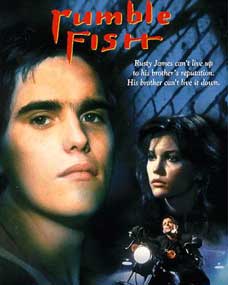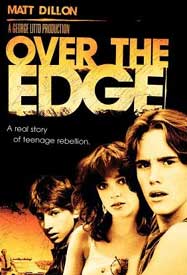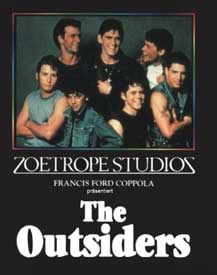It is fabulous to see such fine actors as Matt Dillon, Rob Lowe, Emilio Estevez, Patrick Swayze, in their "brat pack" days of youth, & to see them being such fine actors right from the start. Even Tom Cruise turns up in a small role as a juvenile delinquent. The dvd release restores twenty-two minutes lacking in the original theatrical release.
Carmine Coppola's original score has also been replaced with period rock classics, & I'd have to become reaquainted with the previous version's score to know if a pop soundtrack improves it. Certainly the new soundtrack is befitting, but part of me would like to see successful films not altered for re-release. There's a second disc of "extras" & it's kind of too bad no one decided with so much space to include the original version for comparison.
The central characters as played by Dillon, C. Thomas Howell, & Ralph Macchio are tragic but likable troublemakers whose awful homelives & violent social life is no recipe for happiness in 1960s Tulsa, Oklahoma. A rural West Side Story, the local highschool is divided into lower class Greasers vs middleclass Sosh. We view the drama primarily through the point of view of the greasers, the outsiders from the wrong side of town.
Based on a novel by H. S. Hinton, this is a surprisingly realistic film, less heightened for story effect than might be imagined by anyone who never experienced the times. I'm barely old enough to remember the rural pseudo-gangs of Kent Highschool vs Federal Way Highschool, with greaser youths all dreaming they are James Dean or Marlon Brando, who would meet on pre-designated nights usually after football events, collecting in the enormous parking lot of "The Grotto" (a burger stand) eventually to erupt into violence as boys beat the living daylights out of one another.
I would not get out of my cousin's car when these rumbles occurred, & I never felt any great threat from what were usually innocuous faux battles. But once a tire iron came into play & a Federal Way kid soonafter died of the head injury. Our whole school went into grief mode.
In today's age of drive-by shootings, hardcore beatings merely to be accepted into gangs, kids packing heat for revenge-hits on rival gangs, well, our single high school death occurring after so many largely harmless rumbles isn't much to compare, & the '60s were comparatively innocent times, especially in the more rural places where meth-labs or the the major drug gangs from the city were not yet so much in evidence. But every generation's teenagers feel their lives & tragedies with the same intensity of emotion, & The Outsiders to great extent captures that seriousness & intensity accurately in its context of rural delinquency in the 1960s.
The Outsider provides a credible window into a real time. The only thing I did not recognize was the term "Sosh" & the class distinction in our county would be that the rich kids were just never involved. So "Sosh" for delinquent socialites may have been only an Oky thing.
The one thing missing from this portrait of poor kids in the '60s is how the Viet Nam War hung over these boys' heads like the sword of Damocles, & was a major factor heightening the nihilism of county high school youths. That draft swept through our neighborhood emptying it of boys who could not afford college, while kids in wealthier neighborhoods were omitted from the rosters.
It was vastly more likely those boys would come home in a bodybag by age 20 than ever be the victims of a switchblade in highschool. This is a big omission given that it was the defining reality for teenage boys of that decade. But this critical omission aside, much else reminded me of kids I knew, some few of whom were killed or returned from Viet Nam a lot loonier than when they left home, & I was captivated by the performances & by Ralph Machio's apropos & surely intentional resemblance to Sal Mineo.
 Good as The Outsiders is, it is not anywhere near a great classic film. It is merely a more realistic 1980s version of a whole genre of drive-in "rumble" films of the 50s & 60s that were the actual inspirations for rural teenage rumbles. Good as The Outsiders is, it is not anywhere near a great classic film. It is merely a more realistic 1980s version of a whole genre of drive-in "rumble" films of the 50s & 60s that were the actual inspirations for rural teenage rumbles.
For a truly classically toned film of this sort, the best of the best is Coppola's other entry into the genre, Rumble Fish, likewise based on a H. S. Hinton novel, likewise starring Matt Dillon (in his best role outside of Drugstore Cowboy) & an extraordinary array of the Brat Packers, including Nicholas Cage, Vincent Spano, Laurence Fishburne, besides the older Dennis Hopper. Plus a totally real Diane Lane fulfilling the small but important love interest angle in Rumble Fish even better than she did in The Outsiders.
Rumble Fish one-ups The Outsiders with the most extraordinary black & white photography & a degree of teenage angst that is operatic, stylish performances especially by Dillon & Rourke that are horrifying & rivetting. It is perhaps less recognizable as "real" than is The Outsiders because it is all just so extremely beautiful in its ugliness & violence & sorrow.
It is curious Coppola made both of these films the same year, as Rumble Fish is a genuine work of art, & The Outsiders is a super-competent commercial film that tacks on something of a faux happy ending as Hollywood requires. Rumble Fish represents the high end of making films for the beauty of filmmaking, & The Outsiders a risk-free film for the investors. Both films work but Rumble Fish has the real heart. Fact is, Rumble Fish rather than The Godfather is Coppola's greater masterwork.
 New Granada is an appallingly sterile suburban enclave of the 1970s. In Over the Edge (1979), amilies have fled the dangers of the city buy into the new neighborhood, but their teenage children, rightly & horrifically bored, will eventually erupt when unfairness & injustice is heaped upon them.
Richie (Matt Dillon) & his pal Karl (Michael Eric Kramer) are picked up by a cop who couldn't catch an actual petty-crime kid so settled for who he found. Trumping up a charge of weapons concealment (over a three-inch pocket knife), there is no parental authority who has ever questioned the police, & such are cornerstones of criminal records. New Granada is an appallingly sterile suburban enclave of the 1970s. In Over the Edge (1979), amilies have fled the dangers of the city buy into the new neighborhood, but their teenage children, rightly & horrifically bored, will eventually erupt when unfairness & injustice is heaped upon them.
Richie (Matt Dillon) & his pal Karl (Michael Eric Kramer) are picked up by a cop who couldn't catch an actual petty-crime kid so settled for who he found. Trumping up a charge of weapons concealment (over a three-inch pocket knife), there is no parental authority who has ever questioned the police, & such are cornerstones of criminal records.
The mood is set. Kids living in a tedioius hell tend to get rebellious. Even those that don't rebel are apt to be harrassed by the police for daring to exist. Homeowners worried that a teenage crime wave suppressing property values give their police full leeway to maltreat children & get the "problem" under control.
Matt Dillon's a gorgeous young man with enormous screen presence right from this, his first film. The tale he acts out is painfully realistic in capturing the phobia adults frequently have against youth who are denied a place to gather, a place to dance or listen to their music, even sidewalks to walk on, nothing.
Freeways, airport landing pattern, & a policeman actually named Doberman (Harry Northup). What a world! Adults create environments in which any intelligent kid would be apt to get in trouble from the sheer crappiness of the world, & then come down hard on their heads no matter how small the infraction. Adults in the community haven't a clue what a deadly situation they have created, blaming all their own mistakes on kids.
There's a touchingly authentic love story between Karl & Cory (Pamela Ludwig), but the main thread of the story regards a generational rift as wide as the Mississippi. When a kid is shot & killed, Detective Doberman might realistically call it a justified shooting, but fact is, he had unjustly pre-selected specific kids to destroy one way or another.
After the kid's death, the adults become even more convinced something has gone seriously wrong with universally delinquent youth. They get together for a community meeting at which they lay plans to deprive their children of what little they may have to keep them sane & healthy.
And so the kids finally break. They chain the the doors of the building their parents have gathered in & set out on a rampage of vandalism.
Over the Edge is certainly the first & perhaps still the only film to convey the emotional rationale for destructive rioting. The explosive ending is a first-rate fantasy of justice from below, of youth striking a blow at the face of a totally corrupt, greedy, & foolish world that they did not create, & which does not value any of them.
If it seems all too plausible, it's because it was based on an actual incident. But view it as a fable or it could leave you distraught rather than invigorated.
copyright © by Paghat the Ratgirl
|


